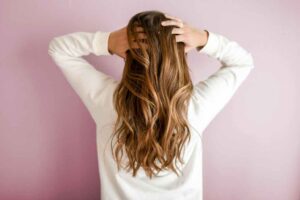Hair oil: Is it safe to leave on hair overnight?
Among the many hair care products that promise better hydration, more shine, and less frizz, hair oil is included.
According to Yoram Harth, dermatologist and director of MDhair, there are several types of oils used in hair, each with different uses and different properties. Generally, though, hair oils are designed to nourish, hydrate, and improve the overall health of the hair.
Typically, hair oil is used in a small amount on the scalp or in a larger amount on sections of the hair from root to tip. Although people using these oils can reap their benefits within two to three hours, many choose to leave them on their scalp overnight and remove them in the morning. But how correct is this choice? Let’s go below to see what the experts say.
What oils can be used on hair?
The type of oil that each person will choose to use depends on the needs of their hair and the results they want to achieve. Hair oils are generally used for cosmetic reasons such as adding shine and reducing frizz. However, some of them, with their properties, can help manage scalp-related conditions such as dryness, flaking, and irritation.
As Harth explained, hair oils can be used for cosmetic reasons, improving the overall texture and appearance of the hair, while some can also offer therapeutic benefits in terms of hair growth and maintaining scalp health. head.
According to Marisa Garshick, a dermatologist at MDCS Dermatology, the main types of oil used on hair are:
- Argan Oil: Argan oil has moisturizing properties and is rich in omega-3 fatty acids and antioxidants. It softens hair texture, reduces frizz, and adds shine. Coconut Oil: Coconut oil is full of fatty acids like lauric acid, which boosts hydration and is great for people with dry hair. It can also improve hair texture and treat dry and itchy scalps. Rosemary Oil: Rosemary oil reduces hair wear and breakage, making hair appear stronger. In addition to its antibacterial and antimicrobial properties, it is also anti-inflammatory, which is very important for reducing scalp redness, irritation, and dandruff. At the same time, it promotes hair growth by stimulating hair follicles. (Also Read: Rosemary Oil: What Are Its Benefits For Hair Growth? )
- Castor Oil: Castor oil contains vitamin E and ricinoleic acid, a type of fatty acid that enhances blood circulation in the scalp. In addition, it provides more shine and strengthens the hair. (Also Read: Castor Oil: Does It Help Hair Growth? )
- Jojoba Oil: Jojoba oil is rich in vitamins such as vitamin A, vitamin B, and vitamin E. It is a light oil that is easily absorbed, making it a good choice for people with thin and oily hair.
It is emphasized that although anyone can use oil on their hair, people with thin or oily hair, especially those prone to acne and scalp folliculitis, should be careful and look for oils that meet their hair type and the condition of their scalp. The advice of a dermatologist is considered important before using the respective product.
Is hair oil good to leave on hair overnight?
According to Anna Chacon, a dermatologist at Miami Derm, hair oils are generally safe to use and leave on the head overnight because they are given time to penetrate deeper into the scalp, providing more hydration and nourishment.
However, prolonged and frequent use of oils on the hair can lead to oil buildup. Therefore, people with thin and oily hair should use it sparingly. People with dry and damaged hair, however, can benefit from prolonged and regular use.
In simple words, the frequency of applying oil to the hair should be proportional to the type of hair and the properties of each oil. It is recommended for people with dry hair to use oil on their hair two to three times a week, while for people with oily hair, it is recommended to use oil once a week. People who do decide to use oil on their hair and leave it on overnight should definitely wash it off the next morning to avoid oil buildup on their scalp and problems like clogged pores.
What are the main causes of dry hair?
There are various factors that can lead to dry hair, such as the environment a person lives in, their hair care habits, and their overall health.
Some of the environmental conditions that can lead to dry hair are the following:
- Dry and hot climate
- Frequent swimming in water containing chlorine
- Frequent swimming in salt water
- Time a person spends in the sun or in the air
Hair care practices that can lead to dry hair are as follows:
- Frequent hair washing
- Using harsh shampoos
- Use of emollients
- Hair dyes containing chemicals
- Use a hair iron for straightening and curling
- Regular drying of hair with a hair dryer
What are the main causes of oily hair?
There are many factors that cause oily hair, such as the following:
- Regular hair brushing
- Regular touching and stroking of hair
- Using too many hair care products
- Regular and excessive hair care
- Regular hair washing
- Use of conditioners at the roots of the hair
- Skin diseases
- Regular use of hair oil
- Shower with hot water
- Consuming plenty of Omega-6 fatty acids and plenty of Omega-3 fatty acids

